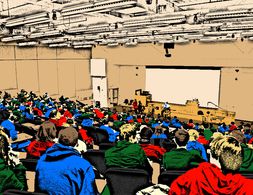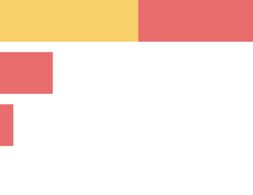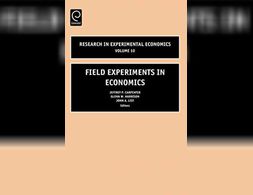450 Ergebnisse
Exploring Economics, an open-source e-learning platform, giving you the opportunity to discover & study a variety of economic theories, topics, and methods.
This article examines the spread of financialization in Germany before the financial crisis. It provides an up-to date overview on the literature on financialization and reviews which of the phenomena typically associated with financialization have emerged in Germany. In particular, the article aims to clarify how the prevailing institutional structure and its changes had contributed to or had countervailed the spread of financialization and how it had shaped the specific German variant of financialization. For this end, it combines the rich literature on Germany's institutional structure with the more macroeconomic oriented literature on financializaton. With the combination of those different perspectives the article sheds light on the reasons for the spread of financialization and the specific forms it has taken in Germany.
In spite of the manifold critique about the state of economics in the aftermath of the financial crisis, an even increasing presence of economists and economic experts can be observed in the public sphere during the last years. On the one hand this reflects the still dominant position of economics in the social sciences as well as the sometimes ignorant attitude of economists towards findings of other social sciences. On the other hand this paper shows that the public debate on politico-economic issues among economists is dominated by a specific subgroup of economists, tightly connected to an institutional network of “German neoliberalism”. This group of “public economists” (i) is dominant in public debates even after the financial crisis, (ii) reproduces the formative German economic imaginary of the Social Market Economy in a German neoliberal interpretation and (iii) has a good access to German economic policymaking, rooted in a long history of economic policy advice.
In this paper the main developments in post-Keynesian macroeconomics since the mid- 1990s will be reviewed. For this purpose the main differences between heterodox economics in general, including post-Keynesian economics, and orthodox economics will be reiterated and an overview over the strands of post-Keynesian economics, their commonalities and developments since the 1930s will be outlined. This will provide the grounds for touching upon three important areas of development and progress of post-Keynesian macroeconomics since the mid-1990s: first, the integration of distribution issues and distributional conflict into short- and long-run macroeconomics, both in theoretical and in empirical/applied works; second, the integrated analysis of money, finance and macroeconomics and its application to changing institutional and historical circumstances, like the process of financialisation; and third, the development of full-blown macroeconomic models, providing alternatives to the mainstream 'New Consensus Model' (NCM), and allowing to derive a full macroeconomic policy mix as a more convincing alternative to the one implied and proposed by the mainstream NCM, which has desperately failed in the face of the recent crises.
The article compares market fundamentalism and right-wing populism on the basis of its core patterns of thinking and reasoning. Based on an analysis of important texts in both fields we find many similarities of these two concepts in their "inner images". Thus, we develop a scheme of the similar dual social worlds of right-wing-populism and market fundamentalism and offer some recent examples of market fundamentalism and right-wing populism mutually reinforcing each other or serving as a gateway for each other. We then apply our scheme for the analysis of the recent political developments and its ideological roots in the US under Donald Trump.
In diesem Beitrag geht es darum, den Postkeynesianismus als paradigmatische Alternative zum herrschenden neoklassischen Mainstream etwas näher kennenzulernen. Es zeigt sich sehr schnell, dass der Postkeynesianismus keine einheitliche Denkschule darstellt, sondern vielmehr eine Vielzahl von theoretischen Ansätzen darunter zu verstehen ist, die eine Reihe von methodologischen und epistemologischen Gemeinsamkeiten aufweist und die einige identitätsstiftende Postulate verbindet. Zum konkreten Nachvollzug dieser Postulate aus dem axiomatischen Kern des Postkeynesianismus wird dann darauf verzichtet, dass Kaleidoskop postkeynesinaischer Theorie mit kaleckianischer, kaldorianischer oder gar sraffianischer Grundlage aufzuzeigen, sondern es wird vielmehr nur ein Postkeynesianismus - die monetäre Theorie der Produktion - in seiner paradigmatischen und formalen Struktur beleuchtet und die darauf aufbauende Theorie der Marktteilnahme als alternative Theorie der Wirtschaftspolitik dargelegt.
Exploring Economics, an open-source e-learning platform, giving you the opportunity to discover & study a variety of economic theories, topics, and methods.
Exploring Economics, an open-source e-learning platform, giving you the opportunity to discover & study a variety of economic theories, topics, and methods.
Exploring Economics, an open-source e-learning platform, giving you the opportunity to discover & study a variety of economic theories, topics, and methods.
Exploring Economics, an open-access e-learning platform, giving you the opportunity to discover & study a variety of economic theories, topics, and methods.
The current Great Recession, the worst crisis that capitalism has faced since the Great Depression, has failed, at least so far, to generate a change in the teaching and practice of Macroeconomics. This seems bizarre as if nothing has happened and the economists are just going about doing business as usual. In light of this, the current paper attempts to address how Macroeconomics ought to be taught to students at the advanced intermediate level, which gives them an overall perspective on the subject.
This paper surveys the development of the concept of socialism from the French Revolution to the socialist calculation debate. Karl Marx’s politics of revolutionary socialism led by an empowered proletariat nurtured by capital accumulation envisions socialism as a “top-down” system resting on political institutions, despite Marx’s keen appreciation of the long-period analysis of the organization of social production in the classical political economists. Collectivist thinking in the work of Enrico Barone and Wilfredo Pareto paved the way for the discussion of socialism purely in terms of the allocation of resources. The Soviet experiment abandoned the mixed economy model of the New Economic Policy for a political-bureaucratic administration of production only loosely connected to theoretical concepts of socialism. The socialist calculation debate reductively recast the problem of socialism as a problem of allocation of resources, leading to general equilibrium theory. Friedrich Hayek responded to the socialist calculation debate by shifting the ground of discussion from class relations to information revelation
Exploring Economics, an open-access e-learning platform, giving you the opportunity to discover & study a variety of economic theories, topics, and methods.
Exploring Economics, an open-access e-learning platform, giving you the opportunity to discover & study a variety of economic theories, topics, and methods.
Exploring Economics, an open-access e-learning platform, giving you the opportunity to discover & study a variety of economic theories, topics, and methods.
After a brief illustration of sovereign green bonds’ features, this paper describes the market evolution and identifies the main benefits and costs for sovereign issuers. The financial performance of these securities is then analysed.
Karl Marx was the greatest champion of the labor theory of value. The logical problems of this theory have, however, split scholars of Marx into two factions: those who regard it as an indivisible component of Marxism, and those who wish to continue the spirit of analysis begun by Marx without the labor theory of value.
Exploring Economics, an open-access e-learning platform, giving you the opportunity to discover & study a variety of economic theories, topics, and methods.
In 18th century Europe figures such as Adam Smith, David Ricardo, Friedrich List and Jean Baptiste Colbert developed theories regarding international trade, which either embraced free trade seeing it as a positive sum game or recommended more cautious and strategic approaches to trade seeing it as a potential danger and a rivalry and often as a zero-sum game. What about today?
A central question in development economics literature is, “Why do countries stay poor?” The key disagreements are whether the lack of economic growth stems from institutions or from geography (Nunn 2009). From an institutional perspective, hostile tariff regimes and commodity price dependencies form a barrier to a sectoral shift that would otherwise lead to economic development in developing countries (Blink and Dorton 2011) (Stiglitz 2006).[i]
The core of Georgism is a policy known as the Land Value Tax (LVT), a policy which Georgists claim will solve many of society and the economy’s ills. Georgism is an interesting school of thought because it has the twin properties that (1) despite a cult following, few people in either mainstream or (non-Georgist) heterodox economics pay it much heed; (2) despite not paying it much heed, both mainstream and heterodox economists largely tend to agree with Georgists. I will focus on the potential benefits Georgists argue an LVT will bring and see if they are borne out empirically. But I will begin by giving a nod to the compelling theoretical and ethical dimensions of George’s analysis, which are impossible to ignore.
Ziel dieses Seminars ist, eine Einführung in die wissenschaftstheoretischen und methodischen Grundlagen der Sozial- und Wirtschaftswissenschaften zu bieten.
This syllabus provides an overview of the contents of the course "Understanding Economic Models" at the University of Helsinki.
Mainstream inflation theories in economics do little to explain the recent acceleration in price increases. The associated economic policy recommendations further increase the misery of low-income groups.
The term "de-risking" can be seen as one element of a strategy aimed at discursively reframing the trade policy confrontation with China. This confrontation has mainly been driven by the US in recent years and received initially cautious, but later growing support from the EU.
Jeden Freitag streiken weltweit Schüler/innen für unsere Zukunft. Sie fordern radikale Maßnahmen für die Einhaltung des Pariser Klimaabkommens ein. In diesem Seminar werden wir uns aus der Perspektive der ökologischen Ökonomie mit ihrer Kritik auseinandersetzen. Im Fokus stehen dabei Ansätze einer Postwachstumsökonomie.
The Nobel laureate Amartya Sen´s text analyzes three main figures in social sciences and the relation between them: the Italian economist Piero Sraffa, the Austrian philosopher Ludwig Wittgenstein, and the Italian politician and philosopher Antonio Gramsci.
This film looks at the role economic growth has had in bringing about this crisis, and explores alternatives to it, offering a vision of hope for the future and a better life for all within planetary boundaries.
In this article, Hannah Ritchie presents the data we need to understand the scale of their contribution, and which countries are most reliant on Ukraine for their food supplies.
In this course you will study the different facets of human development in topics such as education health gender the family land relations risk informal and formal norms public policy and institutions While studying each of these topics we will delve into the following questions What determines the decisions of …
This MOOC (Massive Open Online Course) discusses Global Workers’ Rights and shows instruments and strategies which can be used to implement them.
Experimental economists are leaving the reservation. They are recruiting subjects in the field rather than in the classroom, using field goods rather than induced valuations, and using field context rather than abstract terminology in instructions.
Wir nutzen Cookies. Klicke auf "Akzeptieren" um uns dabei zu helfen, Exploring Economics immer besser zu machen!

























